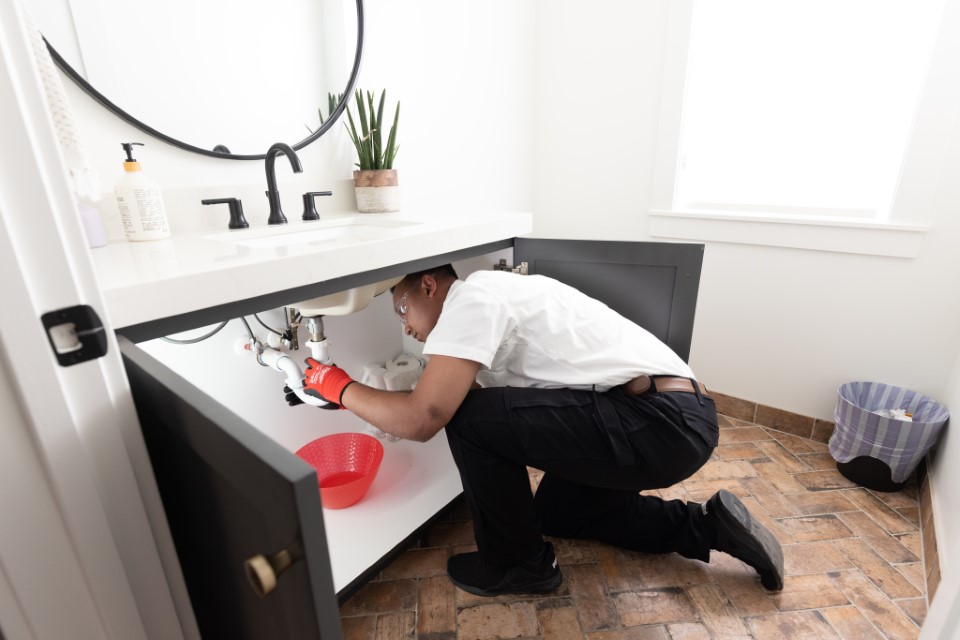Got Frozen Pipes? Learn How to Keep Your Pipes From Freezing in Utah
May 04, 2023

One of the most frustrating things that can happen to your home during winter is getting frozen pipes. The damage to your pipes is bad enough, but it can also result in significant damage to other parts of your home. It’s something people often don’t think about unless it happens to them or someone they know.
There are things you can do with frozen pipes, from thawing them out yourself to calling in an expert to repair the damage. The best thing you can do is to take action ahead of time. The key to dealing with frozen pipes is to prevent freezing from happening or to stop it before it gets worse. These simple tips will show you how.
Frozen Pipes Cause Damage
When it gets really cold in the winter, the water sitting in your pipes can freeze. Pipes that are in exterior walls and colder rooms like crawl spaces and closets are especially vulnerable to freezing. Since these pipes are often tucked away in basements or other seldom visited parts of the home, they can also lead to a lot of damage before they get noticed.
When the water in your plumbing gets cold enough, it turns into ice and that blocks your pipes. Damage can result from the expansion of the ice within the pipe and burst it right there at the point of freezing. While this can happen, the more likely cause of damage from frozen pipes is from the increase in water pressure behind the blockage. When the pipe is blocked off by ice, the water builds up behind the blockage and eventually bursts the pipe. That means the damage caused by a frozen pipe can take place several feet from where the freezing occurs.
Once the pipe bursts, you will need it repaired as soon as possible. The frozen pipes experts at Yes! have plenty of experience in fixing broken pipes and can get to your home right away. We can work with you to get you the most savings possible, which will help make the experience a little less painful.
Let’s be honest, though, nobody wants to have to deal with repairs to broken pipes and the water damage they can cause. To avoid needing repairs in the first place, there are steps you can take to prevent frozen pipes.
How to Keep Pipes from Freezing
The first thing you want to do in order to prevent pipes from freezing is to take inventory of the pipes in your plumbing system. If you need help, you can call Yes! to show you where all of the pipes in your home come in and where they run.
Armed with that information, take note of the pipes that are most vulnerable to freezing. Again, think about pipes that are in colder areas of your home. Pipes that run in exterior walls, in basements, in closets, crawlspaces, or cupboards. These are areas of your home that do not get the same heating from your furnace that the rest of the house gets.
Once you have identified these potential problem areas in your plumbing, you can add insulation or heating coils to those pipes. There are several products you can opt for, from heating tape to foam insulation. They can help keep the cold from penetrating your pipes.
Keep a Close Eye on Your Plumbing
In addition to insulating your pipes in problem areas, you can monitor them more closely. This includes checking for leaks, particularly near connections, and monitoring the flow from faucets fed by the pipes you are concerned about. If you find a leak, be sure to seal it. This will help prevent damage from the leak itself, and it will help keep cold from penetrating the pipes at the location of the leak.
What happens if you have a leak but don’t know about it? When a pipe freezes and leads to a leak several feet from the blockage, that can mean the leak is outside of your house and taking place without anyone noticing.
One thing you can do to watch for this happening is to keep a close eye on your water bill. We don’t tend to think about the water bill during winter when the sprinklers have been turned off. If you see a spike in your water bill, particularly in the winter, it could mean there is a leak somewhere. If that is the case, contact the experts at Yes! right away. Even a tiny crack can lead to hundreds or even thousands of gallons of water leaking into your property.
By keeping an eye on your pipes and faucets, you can notice any changes that might have resulted from freezing. When pipes start to freeze, you will notice a reduction in water flow. When this happens on a cold day, it is time to take action. First, turn on your faucets to a slow flow. Then, turn up the heat in your house. Make sure you open doors and cabinets where frozen pipes might be hiding. You can also turn fans or space heaters on the suspected areas to direct more heat their way. By heating the pipes, you can stop or melt the freezing before it completely blocks your pipes and causes damage.
Even before you notice potential freezing, there are other things you can do. Perhaps the easiest and most effective thing you can do is to leave your water running at a very slow stream or trickle. This is especially important for faucets fed by pipes that could be prone to freezing. Check the forecast and turn on faucets when it gets really cold, especially overnight.
When you leave water on at a slow stream or a trickle, it keeps the pipes from freezing by keeping the water moving. It also helps to keep water pressure from building up. This simple measure can help keep your pipes from freezing. That alone can give you the peace of mind you want on really cold winter nights.
Watch Outdoor Faucets Too
Utah’s extreme climate makes it necessary to winterize your home each fall. Part of that process includes disconnecting hoses from outdoor faucets. Hoses always retain a little water, and they can lead to freezing back into your pipes if they are left connected when it’s cold. Even outdoor faucets designed to not freeze in the cold can be susceptible to freezing when it gets really cold, especially with the hose still attached.
There is another level of protection you can add to keep your outdoor faucets from freezing. You can add an insulated cover to your outdoor faucets for good measure. They are relatively simple in design and can be found fairly easily. One type is an insulated bag that fits over an outdoor faucet and is cinched up to keep it tight. This really helps to keep the cold out of your pipes.
Don’t Let It Get Too Cold
Another thing to have in mind is to always keep your house heated in the winter, even if you go out of town. You can set your thermostat to a lower temperature to save energy if you leave town, but don’t ever let it get below 55 degrees Fahrenheit. A cold house could lead to frozen pipes, and that is not something you want to come home to.
When setting your thermostat before leaving town, think about the areas of your house that stay colder and have pipes running through them. You might want to think about setting the temperature higher to protect these areas of your home. You can also open closet and basement doors as well as cabinets and other parts of your home where pipes run.
In addition to keeping your house heated when you are away for an extended period of time, you can ask for help. Ask a neighbor to check on your house to make sure it feels warm enough inside. Ask them to check the thermostat to make sure it is above 55 degrees and to make sure the faucets are dripping to keep the water flowing. While they are at it, they can bring in the mail and check on the house to help ensure it stays safe and secure. After all, that’s what friends are for.
The more preventive measures you take, the more successful you can be when it comes to preventing your pipes from freezing. While it might seem like a lot of work to keep a good eye on your pipes throughout the winter, that’s nothing compared to the headache and cost of having to repair broken pipes and damage caused by flooding.
Contact Us
Nobody wants to deal with frozen pipes. If it ever happens to your home, you can trust the experts at Yes! to take care of it. You can also call us with any questions you have about how to keep pipes from freezing. Our friendly team is here to help. For additional information on plumbing services, call our team at 844-216-9300 and speak with a technician today.
Last Updated: May 25, 2023
